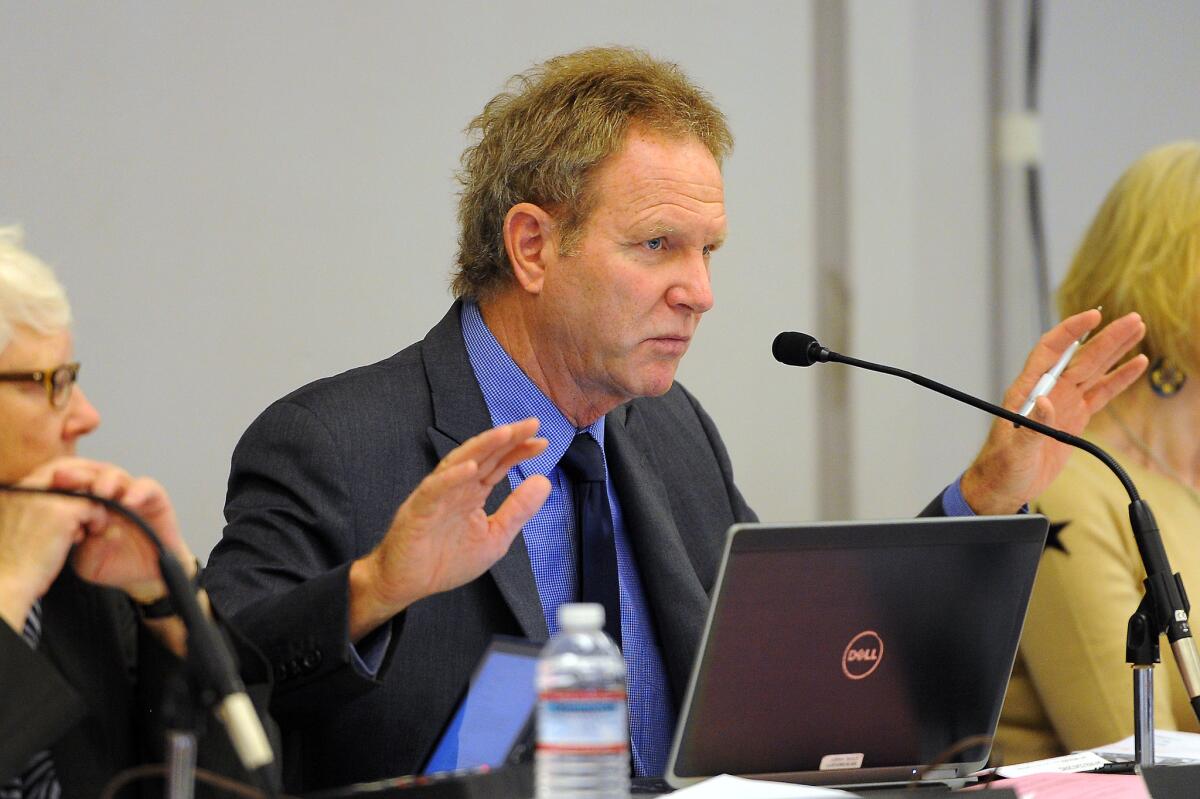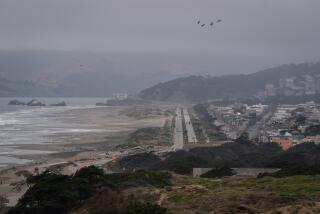Coastal Commission chairman may recuse himself from vote after failing to disclose private meetings

Commissioner Steve Kinsey conducts the first California Coastal Commission hearing since the firing of executive director Charles Lester at the Santa Monica Civic Auditorium.
The chairman of the California Coastal Commission on Wednesday asked the agency’s attorney to determine whether he should recuse himself from voting on a massive development along the Orange County coast after he held two unreported private meetings with project representatives.
Steve Kinsey’s surprise announcement comes a week after he acknowledged failing to publicly disclose a private meeting he attended Dec. 22 with developers of the Newport Banning Ranch project, saying he lost track of it during the holidays.
This week, the Los Angeles Times asked Kinsey about a second, earlier undisclosed communication with representatives of Banning Ranch, an enormous housing and retail project proposed for the largest remaining parcel of undeveloped coastal land in Southern California. Kinsey has not filed the required disclosure form about that Nov. 4 meeting, records show.
“I see the importance of the law,” Kinsey said at the beginning of Wednesday’s Coastal Commission meeting. “I take my responsibilities seriously.... I will be ever more cautious going forward. I apologize to the public, the commission and the applicants themselves.”
Kinsey’s remarks came as three other commissioners, Carole Groom, Mary Luevano and Wendy Mitchell, decided not to participate in so-called ex-parte communications with third parties, at least until the Legislature takes action on a bill to ban the practice at the powerful planning agency.
Ex-parte communications have become an issue since commissioners fired Executive Director Charles Lester in February amid criticism that some commissioners were getting too cozy with developers. Opponents of Banning Ranch say the project is a prime example of the agency’s shift toward development and the way some commissioners have been questioning the staff’s scientific findings related to the proposal.
Ex-parte communications are private verbal or written communications between individual commissioners and interested parties that could influence a decision.
Agency rules require commissioners to fully disclose meetings, phone calls and written communications that occur outside of official public meetings within seven days of the communication. They also must report ex-partes orally from the dais if they occur within seven days of the matter being heard by the commission.
Those who fail to report a private contact can be prohibited from voting on the matter that was discussed and from trying to influence the commission’s decision. Violations of the disclosure requirements also carry fines of as much as $7,500, and commission decisions affected by a violation can be revoked.
Ralph Faust, who was the general counsel for the Coastal Commission from 1986 to 2006, said that the ex-parte disclosure rules are clear and that violations can open the commission to civil lawsuits that could overturn decisions and result in penalties.
“It puts the decision at risk,” Faust said. “It creates a separate ground on which to challenge whatever decision the commission might come to.”
Faust and attorney Deborah Sivas, director of the Environmental Law Clinic at Stanford University, said they do not know of any disclosure-related cases that have been brought against the commission.
Sivas added, “I would say about Kinsey there is some cause for concern.”
In a story about Banning Ranch published Saturday, The Times reported that Kinsey did not file a disclosure form on the Dec. 22 meeting until after being questioned by the newspaper. Kinsey said he subsequently disclosed the meeting and intended to participate in future hearings involving the controversial proposal.
Kinsey said his delay in submitting the required form “will not have a material impact on the proceeding given that I have now filed.” He said he also discussed the matter with the commission’s general counsel, the executive director of the Banning Ranch Conservancy and Banning Ranch representatives.
“My lapse in filing occurred when I returned from the ensuing 10-day holiday,” Kinsey said. “I simply lost track of filing my ex-parte, and the new year brought a wave of other commission duties that occupied my attention.”
He has offered no explanation for failing to disclose the Nov. 4 meeting.
The Banning Ranch project calls for 895 homes, 45,100 square feet of retail space and a hotel to be built on 400 acres about 1,000 feet from the Pacific Ocean. Dotted with oil facilities, the land is the largest undeveloped coastal parcel in Southern California.
The 12-member commission is scheduled to vote on the project this summer.
After Kinsey’s two private meetings with the developer, which included a five-hour site tour, he wrote a detailed memo in January to commission Deputy Director Sherilyn Sarb.
In it, he made reference to the tour and challenged the staff’s assessment of environmentally sensitive habitat on the Banning Ranch property. Staff scientists determined that those areas should be protected from development.
“My overall impression is that the site has been so heavily degraded by historic oil operations that many of the areas identified as environmentally sensitive habitat in the staff’s October presentation seem unwarranted,” Kinsey wrote.
The Nov. 4 private communication involved Kinsey, commissioner Dayna Bochco and three Banning Ranch representatives.
Bochco disclosed the meeting two days later. However, there is no record that Kinsey filed the appropriate public document, which contains the date, place, participants in the ex-parte and a summary of the discussion.
After he was contacted Tuesday by The Times about the Nov. 4 meeting, Kinsey said he would address the matter at Wednesday’s commission meeting.
Meanwhile, the bill to ban ex-partes by commissioners is scheduled for a vote in the state Senate this week.
Sen. Hannah-Beth Jackson (D-Santa Barbara), the author of the measure, said it would protect the integrity of the commission’s quasi judicial process — a court-like proceeding in which the panel hears from both sides much like a judge hears evidence before making a decision.
“This bill will level the playing field between big-moneyed interests and those without such financial resources,” Jackson has said of the legislation. “It will remove the possibility of backroom decision-making or the perception that it’s occurring and will help ensure that decisions are made more openly and transparently.”
Follow on Twitter @LADeadline16
See more of our top stories on Facebook >>
ALSO
Judge orders a man accused of starting the Da Vinci apartment fire to stand trial
Girl repeatedly molested by Diamond Bar teacher awarded $8 million by jury
Glendale doctor faces 20 years in prison for selling painkiller prescriptions to undercover officers
More to Read
Start your day right
Sign up for Essential California for news, features and recommendations from the L.A. Times and beyond in your inbox six days a week.
You may occasionally receive promotional content from the Los Angeles Times.







